TSA Is Making Another Major Change to Airport Security
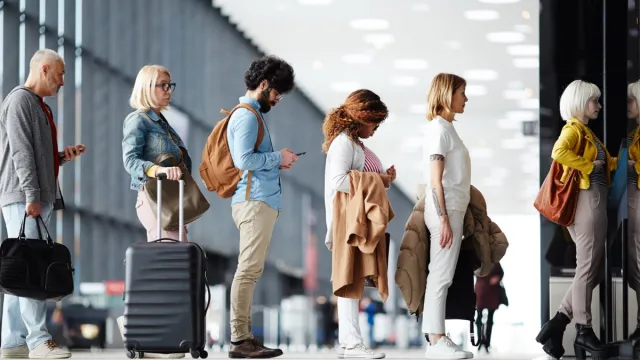
Traveling is a multistep process when you’re flying—from planning to booking tickets to actually getting on the plane. The airport presents its own challenges: You have to plan your transport to and from, check your bags, and then make it through the dreaded security line. We’ve all been conditioned to allow enough time to get through the checkpoint and make it to the gate on time—perhaps with a few extra minutes to grab a bite before boarding. But now, the Transportation Security Administration (TSA) announced a major change that could affect the screening process at your nearest airport. Read on to find out about the latest TSA update.
READ THIS NEXT: TSA Issues New Alert on What You Can’t Carry Through Security.
Airport security makes regular changes to its procedures.
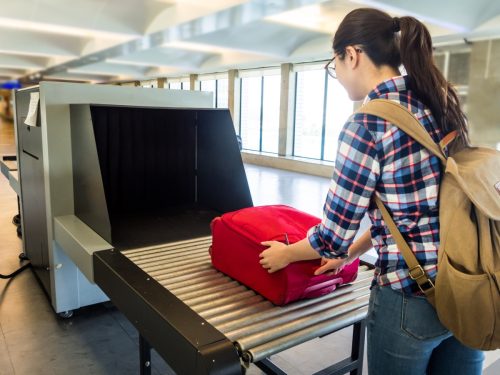
The screening process at the airport has undergone a number of updates throughout 2022.
In April, TSA introduced new computed tomography (CT) scanning machines used to check carry-on luggage at checkpoints. According to The Points Guy, passengers were experiencing delays in the security line, even though TSA stated that the new technology was intended to speed things up by eliminating the need to remove certain items. The slowdown was attributed to training issues, which presented “a learning curve for officers,” a TSA spokesperson told The Points Guy.
In June, TSA also rolled out Credential Authentication Technology (CAT), which allowed passengers to have their identity confirmed without taking out a boarding pass. The machines scan your photo ID at the checkpoint and confirm your identity via the Secure Flight database—which contains the names of all ticketed travelers for a 24-hour period, Lorie Dankers, a TSA spokesperson, told CN Traveler.
Now, these CAT devices are upping the ante by adding an extra layer of security.
Get ready to have your picture taken.
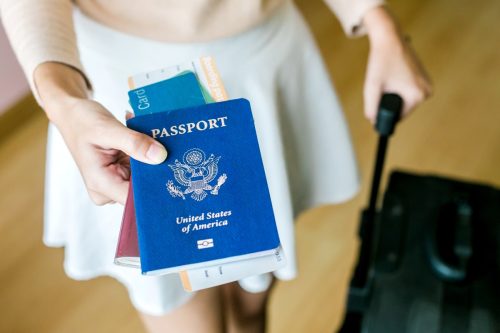
According to a Nov. 18 press release, TSA has introduced “state-of-the-art identity verification technology” in the form of the CAT-2. The units are the “next generation” of CAT technology and have been rolled out at Denver International Airport (DEN), per the release.
The CAT-2 maintains all of the capabilities of its predecessor—meaning you won’t have to present your boarding pass—but also has a camera “that captures a real-time photo of the traveler.” The system then compares the photo “on the identification credential” with the photo taken at the checkpoint, and once it confirms your identity, a TSA agent will let you know that you can proceed.
“Identity verification of every traveler prior to flying is a key step in the security screening process. TSA embraces the use of this type of technology to enhance security and increase the efficiency of our operation,” TSA Federal Security Director for Colorado Larry Nau, said in the release. “We are grateful for our partners locally who have been key in bringing this capability to DEN and for the investment TSA made in the security operations at DEN.”
RELATED: For more up-to-date information, sign up for our daily newsletter.
TSA reassures passengers that information and photos aren’t saved.
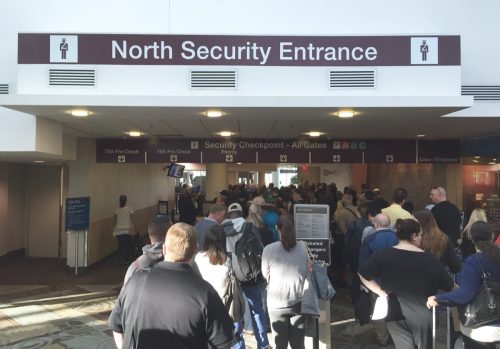
Per the release, photos are not stored in the CAT-2, and if you don’t want your photo taken, you can choose to go through an alternate identity verification process. “There are a lot of concerns about whether we retain the images, the images are released immediately so there is nothing in the system,” Nau told CBS Colorado. “It’s an extra layer of security for us.”
A press release from TSA published on Oct. 27 further confirmed that these units don’t store your biometric information, and by the time the passenger behind you approaches, your information is deleted. “Maintaining passenger dignity is an agency priority and new technologies, like CAT-2, should enhance both transportation security and the passenger experience,” the release states.
There are five CAT-2 readers at DEN, all located in the North Security Checkpoint. There are an additional 21 of the first-generation CAT units located at each of the three checkpoints at DEN, but Nau told CBS Colorado that the CAT-2 units are now just being used in designated lanes.
“Currently, we’re utilizing this technology in our PreCheck lanes; one because we have a known quantity of folks who come through every day with their PreCheck, and we have their background so as we soft rollout with the technology, we can see where there might be a risk or not,” Nau said.
You can leave your ID tucked away.
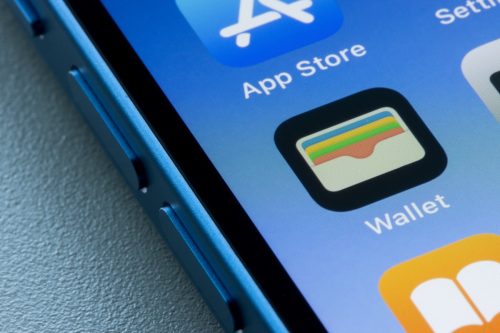
While it’s nice to not have to worry about your boarding pass, the CAT and CAT-2 eliminate the need for a physical ID.
According to the press release, the CAT-2 units have readers that scan your state-issued digital driver’s licenses or digital ID cards. Currently, Arizona, Maryland, and Colorado are the three states that allow you to upload a mobile ID to your Apple Wallet app, according to TSA’s website, and you can simply tap your iPhone or Apple Watch on the CAT-2 digital reader “in lieu of providing a physical ID for identity verification.”
Other states also allow you to use a form of mobile identification through the American Airline Mobile ID app and the Delta Air Lines Biometric Facial Identification via your SkyMiles profile in the Fly Delta app. However, TSA states that travelers should still travel with hardcopy licenses or photo ID, as you might be requested to provide an alternative form at the checkpoint. Only travelers with TSA PreCheck are currently able to participate in the digital ID initiative, “with options for all travelers coming,” according to TSA’s website.